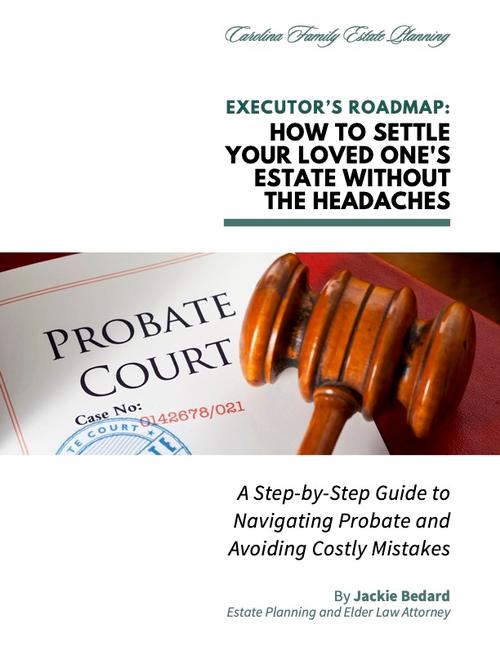
When you plan for how your estate is administered after your death, naming an executor of your will is an important step to take. After your death, your executor, among other things, will be responsible for using your financial assets and property to pay off any remaining debt and any taxes you may owe.
Whether you are considering who to assign as your executor or have been asked to be an executor, knowing the qualifications for this responsibility is essential. The probate lawyers at Carolina Family Estate Planning are here to answer any questions you may have about North Carolina’s executor qualifications. We also put together a free guide to help you gain an overview of the estate administration process in plain English. You can download a copy of our free guide, Understanding Estate Administration.
What Is an Executor?
An executor is appointed under the decedent’s (person who died) will and given authority by the Court as having legal responsibility to collect the decedent’s assets, pay their valid debts, and distribute their property to the beneficiaries. Some people name an attorney as their executor, but most name a family member, such as a spouse, parent, or child. If you don't choose an executor, the Court will choose one for you.
If you have been named an executor, you will be responsible for ensuring that every request made in the will is carried out. You must also safeguard the estate's assets and distribute funds to pay the estate's debts. If you do not, you may be held legally liable. Serving as an executor for some estates is relatively simple, whereas others can be complex and difficult.
An Executor must first get formally appointed by the probate court before the Executor can begin taking action on behalf of the estate. Usually, the first actions taken by an Executor include:
- Preparing and filing the applicable forms and documents to get appointed as Executor by the court.
- Sending required notifications to applicable potential heirs and beneficiaries.
- Gathering information about the estate, including information about assets, debts, insurance policies, and similar.
Executors conduct the following tasks upon the decedent’s behalf, using the money from the estate:
- Pay any remaining taxes and file tax returns
- Pay bills or debts
- Distribute assets as stated in the will
An executor may also need to perform these additional duties:
- Find the will and other related documents after death
- Hire an appraiser to appraise the property
- Publish a notice to creditors
- Create a final accounting with the court
Executors can decline the responsibility at any time, even after they have been named in the will. As a result, individuals should be sure to receive the executor’s consent and discuss their potential responsibilities before naming them in the will. They should also name alternative executors who can take the responsibility if the initial executor is unwilling or unable to do so.
Basic Requirements to Serve as an Executor in North Carolina
In North Carolina, individuals must be 18 or older and of sound mind to serve as an executor. Being of sound mind means not being officially judged as incapacitated by a court.
Along with the basic requirements above, North Carolina Statutes disqualify certain individuals and entities from serving as executors. No person is qualified to serve as an executor of a will in North Carolina who:
- Is a convicted felon under the laws either of the United States or any state or territory of the United States or of the District of Columbia and whose citizenship has not been restored
- Is a nonresident of the state who has not appointed a resident agent in North Carolina to accept service of process in all actions or proceedings with respect to the estate and cause such appointment to be filed with the North Carolina court
- Has committed acts which by law constitute a forfeiture of the right to serve
- Is illiterate
While North Carolina statutes permit corporations to serve as executors, the corporations must transact business within the state to qualify. Generally, most wills lawyers recommend appointing individuals, not corporations, as executors. The clerk of superior courts can also deem individuals unsuitable as executors.
How to Choose the Right Executor
Even if someone qualifies to serve as an executor, it does not mean they would be a responsible executor for your will. We recommend using discretion as you determine the right person to manage your estate after your death. Here are a few tips to help you make the right decision:
- Choose someone close to you. Choosing an immediate family member, such as a spouse or child, can make the process of obtaining your assets and managing your property easier after your death. If possible, selecting someone who already lives in your house can also streamline the probate process.
- Select a responsible person. Your executor will need to juggle several newfound responsibilities after your death. If the person you’re considering is not very responsible now, you may not be able to trust them with your estate and assets after your death.
- Choose someone in good financial standing. Along with choosing a responsible person to handle your estate, you should also consider someone in good financial standing. If your executor is in debt, they may struggle to manage your money responsibly.
- Name an emotionally balanced person. Grief can make it challenging for anyone to focus on managing an estate after a person dies. However, some individuals may be in a better emotional state to handle your estate after your death than others.
- Consider a younger person. If your initial executor is a spouse or parent, there is some risk that you could outlive them. We also recommend adding an alternative executor who is younger than you to increase the chances that the person will still be alive after you pass.


